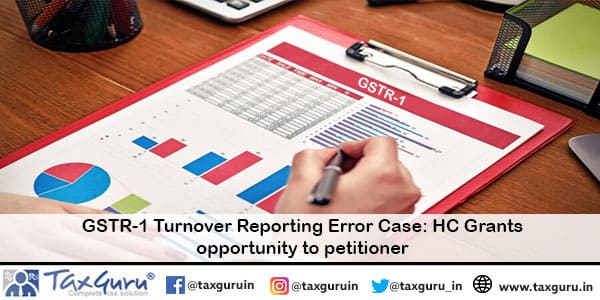Case Law Details
Parthasarathy Narasimhan Vs Deputy Commercial/State Tax Officer (Madras High Court)
The recent judgment by the Madras High Court in the case of Parthasarathy Narasimhan vs. Deputy Commercial/State Tax Officer highlights a significant issue stemming from an error in GSTR-1 turnover reporting. The petitioner contested an assessment order that imposed a substantial tax liability, arguing that the reported turnover was inaccurately high due to an inadvertent error.
The petitioner, a registered entity under GST enactments, discovered that their turnover was erroneously reported in the GSTR-1 return as Rs. 9,22,89,895/- instead of Rs. 92,28,895/-. This reporting error led to a hefty tax liability of Rs. 1,48,20,834/-. Despite the petitioner’s subsequent representation clarifying the error and providing evidence supporting the correct turnover, the authorities proceeded with the assessment order without granting an opportunity for contestation.
In response, the Madras High Court intervened, noting the petitioner’s plea and the substantial disparity between the reported and actual turnover figures. The court found merit in the petitioner’s argument that the entire tax liability arose due to the erroneous reporting in the GSTR-1 return. Consequently, the court quashed the assessment order and remanded the matter for reconsideration, emphasizing the importance of providing the petitioner with a fair opportunity to contest the tax demand.
The judgment of the Madras High Court in Parthasarathy Narasimhan vs. Deputy Commercial/State Tax Officer serves as a reminder of the potential consequences of errors in GST reporting. Beyond merely rectifying mistakes, this case underscores the necessity for authorities to afford taxpayers the chance to present their case and rectify discrepancies before imposing substantial tax liabilities.
FULL TEXT OF THE JUDGMENT/ORDER OF MADRAS HIGH COURT
Both the assessment order dated 20.12.2023 and order dated 15.03.2024 rejecting the rectification petition are challenged in the writ petition.
2. The petitioner states that he was a registered person under applicable GST enactments. Pursuant to the request made by the petitioner, the GST registration of the petitioner was cancelled on 21.01.2021. The petitioner asserts that he was unaware of proceedings initiated thereafter and culminating in the impugned assessment order dated 20.12.2023. After coming to know of the same, the petitioner submitted a representation dated 05.02.2024 to the effect that the turnover of the petitioner was erroneously reported in the GSTR 1 return as Rs.9,22,89,895/- instead of Rs.92,28,895/-. According to the petitioner, the correct turnover was reported in the GSTR 3B return and the entire tax liability is on account of an inadvertent error committed while filing the GSTR 1 return.

3. By referring to the petitioner’s reply dated 05.02.2024, learned counsel for the petitioner submitted that the correct turnover of Rs.9,22,89,895/- is supported by the petitioner’s invoices and, therefore, the petitioner should be provided an opportunity to contest the tax demand.
4. Mr. T.N.C. Kaushik, learned Additional Government Pleader, accepts notice on behalf of the respondent. He submits that the petitioner failed to respond to any of the notices preceding the impugned assessment order. As regards the rectification order, learned Additional Government Pleader submits that it was recorded therein that a revision of assessment cannot be carried out in the rectification proceeding.
5. The petitioner’s reply dated 05.02.2024 has been placed on record. In such reply, the petitioner asserted that the correct turnover was Rs.92,28,895/- and not Rs.9,22,89,895/- as wrongly reported in the GSTR 1 return. Since the petitioner did not file the annual return for the relevant assessment period, it appears that the petitioner did not rectify this error in the annual return. A tax liability of Rs.1,48,20,834/- was imposed on the petitioner under the impugned assessment order. Prima facie, it appears that such tax liability had arisen only on account of the turnover reported in the GSTR 1 return. In these circumstances, the interest of justice warrants that the petitioner be provided an opportunity to establish that the genuine turnover was only Rs.92,28,895/- and not Rs.9,22,89,895/-. Solely for such reason, the impugned order calls for interference.
6. Therefore, the impugned order dated 20.12.2023 is quashed and the matter is remanded for reconsideration. The petitioner is permitted to submit a reply to the show cause notice dated 20.09.2023 by enclosing all relevant documents. Such reply shall be submitted within a maximum period of two months from the date of receipt of a copy of this order. Upon receipt thereof, the respondent is directed to provide a reasonable opportunity to the petitioner, including a personal hearing, and thereafter issue a fresh order within a period of two months from the date of receipt of the petitioner’s reply. As a corollary of the assessment order being quashed, the bank attachment is raised.
7. W.P.No.8798 of 2024 is disposed of on the above terms without any order as to costs. Consequently, the connected miscellaneous petitions are also closed.





